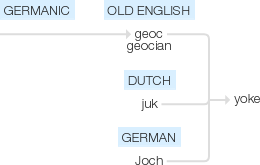Yoke
Old English geoc (noun), geocian (verb), of Germanic origin; related to Dutch juk, German Joch, from an Indo-European root shared by Latin jugum and Greek zugon, also by Latin jungere ‘to join’.
wiktionary
From Middle English yok, ȝok, from Old English ġeoc, from Proto-Germanic *juką, from Proto-Indo-European *yugóm. Doublet of yuga.
yoke
etymonline
yoke (n.)
Old English geoc "contrivance for fastening a pair of draft animals," earlier geoht "pair of draft animals" (especially oxen), from Proto-Germanic *yukam (source also of Old Saxon juk, Old Norse ok, Danish aag, Middle Dutch joc, Dutch juk, Old High German joh, German joch, Gothic juk "yoke"), from PIE root *yeug- "to join." Figurative sense of "heavy burden, oppression, servitude" was in Old English.
yoke (v.)
Old English geocian "to yoke, join together," from yoke (n.). Related: Yoked; yoking.
